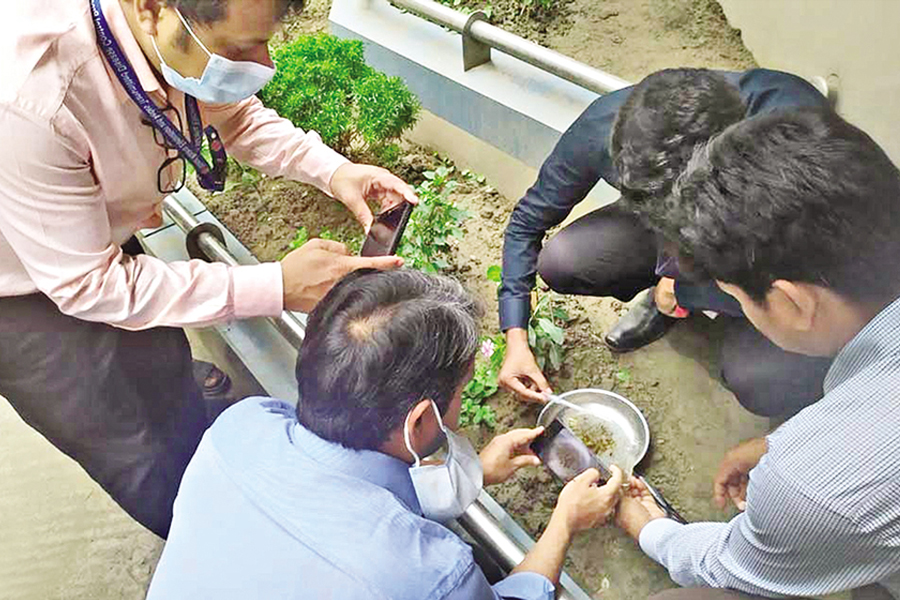
Published :
Updated :

With the advent of the monsoon, the prevalence of dengue fever in the capital and other regions of the country has once again emerged as an all-too-familiar concern. Regrettably, this recurrence is not merely seasonal -- it is symptomatic of the persistent lack of a systemic and sustainable strategy to combat the mosquito-borne disease. Despite the known risks, there has never been a well-coordinated effort on the part of the authorities to decisively address the threat of dengue.
Reports from across the country, including Dhaka, indicate that the dengue situation has taken a serious turn. In the capital alone, hundreds have recently fallen ill, with a significant number requiring hospitalisation this month. Although the current situation might not yet be deemed alarming, past experiences remind us how swiftly things can escalate. Dengue outbreaks in previous years have demonstrated the disease's potential to spiral into a full-blown health emergency within weeks.
According to the Directorate General of Health Services (DGHS), the total number of deaths from dengue this year has already reached 29, with confirmed cases standing at 5,739 since January. The most recent fatality was reported from the Chattogram Division, outside the city corporation areas. The latest figures further reveal that the Barishal Division saw the highest number of new dengue cases (101), followed by Chattogram Division (28), Dhaka Division excluding the city corporations (5), Dhaka South City Corporation (19), and Dhaka North City Corporation (16). As of Saturday morning, 633 dengue patients were undergoing treatment in hospitals across the country.
Last year marked the worst dengue outbreak in Bangladesh's history. The country recorded 101,214 confirmed cases and 575 fatalities -- an unprecedented prevalence. Such staggering figures underscore the urgency of a more serious and scientific approach to combating this recurring menace.
A decade ago, when dengue first took a heavy toll nationwide, the healthcare system -- both public and private -- was largely unprepared. Medical facilities were inadequate, contributing to the higher deaths. While the situation in urban areas has somewhat improved since then, casualties still occur, particularly in smaller towns and rural regions. In these areas, a combination of poor awareness and limited access to timely medical care exacerbates the crisis. Experts also note that children, especially minors, are particularly vulnerable, with a higher fatality rate among them compared to adults.
Despite the recurring nature of dengue outbreaks, awareness campaigns and mosquito eradication drives are glaringly absent in urban centres like Dhaka. This neglect is deeply concerning, especially as the monsoon intensifies. The risk of dengue reaching epidemic proportions looms large, and already, a few fatalities have been recorded in the capital. Unfortunately, both Dhaka South and North City Corporations appear to be passive observers. There is little visible activity in the municipal wards to raise public awareness or to carry out anti-mosquito measures.
Frustration is mounting among citizens and public health professionals alike as the authorities continue to rely on the same outmoded methods of mosquito control. These conventional approaches not only lack innovation but have also been repeatedly proven ineffective. In a recent conference held in the capital, entomologists described the city corporations' current strategies as unscientific and even counterproductive. They argue that these measures may actually be contributing to the surge in cases.
The most commonly used method - fogging -- is particularly under scrutiny. Experts have warned for years that fogging is largely ineffective in controlling Aedes aegypti, the mosquito responsible for spreading dengue. These mosquitoes typically breed in clean, stagnant water found in household containers, not in the drains or sewers targeted by fogging. At best, fogging can eliminate only about 20 per cent of the mosquito population and does little to address the root of the problem.
Moreover, ad-hoc solutions like importing Bacillus thuringiensis israelensis (BTI), a bacterium used to control mosquito larvae, are unlikely to yield long-term results. Without a proper understanding of the local environment and mosquito ecology, such interventions risk being not only ineffective but also potentially hazardous. Experts cite the example of Kolkata, where a scientifically coordinated, community-based mosquito control programme -- designed by entomologists and health professionals -- has shown success in containing dengue.
The question is, why has Bangladesh not adopted a similarly science-based approach? The answer points to a systemic failure of governance and institutional inertia. It is now evident that our health institutions lack the data, research infrastructure, and, most worryingly, the will to collaborate with experts in entomology, epidemiology, and urban planning. The absence of a comprehensive, research-informed action plan reflects total disconnect between policymaking and ground realities.
It is imperative that the government urgently bring together a multidisciplinary taskforce comprising doctors, entomologists, public health specialists, city corporation officials, urban planners, and civil society stakeholders. Such collaboration is essential to design both immediate interventions and long-term strategies to control and eventually eliminate dengue. Efforts must be made to understand transmission patterns, evaluate the efficacy of the current control methods and pilot new technologies for vector control.
Above all, science -- not bureaucracy -- must guide the country's response to this escalating public health threat. Traditional, reactive approaches have failed us repeatedly. The time has come for proactive, data-driven strategies and to follow international best practices. The fight against dengue can no longer be managed by cosmetic efforts. It demands urgency, innovation, and above all, political will.
wasiahmed.bd@gmail.com


 For all latest news, follow The Financial Express Google News channel.
For all latest news, follow The Financial Express Google News channel.